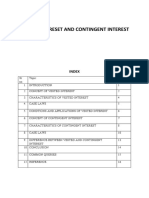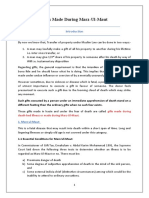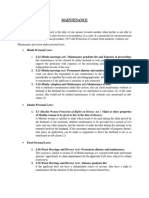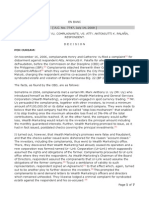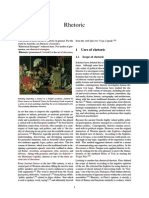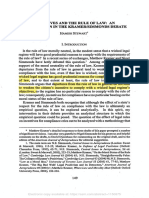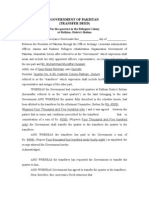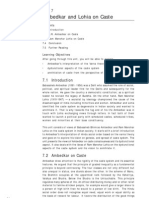Nature of Contingent Interest
Nature of Contingent Interest
Uploaded by
Pushkar Anand RathoreCopyright:
Available Formats
Nature of Contingent Interest
Nature of Contingent Interest
Uploaded by
Pushkar Anand RathoreCopyright
Available Formats
Share this document
Did you find this document useful?
Is this content inappropriate?
Copyright:
Available Formats
Nature of Contingent Interest
Nature of Contingent Interest
Uploaded by
Pushkar Anand RathoreCopyright:
Available Formats
Nature of Contingent Interest Contingent Interest is a transferable interest--- A contingent interest, not being a mere possibility is a well recognized
form of property which is capable of being transferred. Such a transfer would effectually pass to the transferee, all the interest which the transferor possessed when the contingency happened and the interest vested in possession. But though a contingent interest can be made the subject of a valid transfer inter vivos it cannot be made the subject of a forced sale in attachment proceedings1 [vide Section 60, sub-section (1), clause (m), Code of Civil Procedure]. It has been held that a contingent interest is not an existing right and may never ripen to existing right and is not a sufficient ground to an action for declaration of a right.2 Not Heritable- A contingent interest is not a heritable interest. On the death of a person having contingent interest, his legal heirs do not get anything, not even the contingent interest. After the death of such person it is only his vested interest which can be inherited. In Rajesh Kanta Roy v. Smt. Shanti Devi,3 the Supreme Court observed: In the case of a contingent interest, one of the features is that if a person dies before the contingency disappears and before the vesting occurs, the heirs of such person do not get the benefit of the gift (transfer). Death not an uncertain event, but survival at death of another is.- The death of a person is not an uncertain event , but is a certain one. An interest created to take effect on the death of another person is, therefore, not a contingent one, but is a vested interest. The survival or being alive of a person at the death of another is, on the other hand, an uncertain event and consequently a transfer to a person if he survives or is alive at the death of another creates only a contingent interest. Transfers to person at particular age. - A transfer to a person to take effect upon his attaining a particular age gives him only a contingent interest till he attains that age. The question is to be decided having regard to the intention of transferor as expressed by the words used by him and by other circumstances. A certain sum of money is transferred to A in case he shall attain the age of 18 or when he shall attain the age of 18. Held, in both the cases contingent interest was given. It is ordinarily a contingent interest given when a transfer is at a given age or upon attaining or as the transferee shall attain or after his attaining certain age, is made. In England, it has been held that a gift to such a class of persons as shall attain a particular age, is only a contingent gift. In Festings case,4 where a gift was made to A for life, and then to such of her children as shall attain the age of 21 years, it was held that the gift to the children created only a contingent interest. In Ma Yaits case,5 where under a settlement of an interest was created in favour of all the children of the settler to take effect after the youngest child attained the age of 20,
1 2
Fernando v. Gunatiloaka, 1921 P.C 138. S.C. Deb v. B.K. Deb, 35 Cal. 777. 3 A.I.R 1957 S.C. 255 4 Festing v. Allen, (1843) 152 E.R. 1204. 5 Ma Yait v. Official Assistance, 1930 P.C. 17.
it was held by the Privy Council that until youngest child attained the age of children had only a contingent interest in the property. Contingent interest when becomes vested.-An interest contingent on the happening of a specified event becomes vested on the happening of that event. If the contingency becomes impossible, the interest never comes into effect. An interest, to take effect if a specified uncertain event shall not happen, will become vested when the happening of the event becomes impossible.
You might also like
- QC Organizaitonal ChartDocument1 pageQC Organizaitonal ChartmetaNo ratings yet
- Essential Soft Skills for Lawyers: What They Are and How to Develop ThemFrom EverandEssential Soft Skills for Lawyers: What They Are and How to Develop ThemNo ratings yet
- Secretary's Certification - Auth To Sell PropertyDocument6 pagesSecretary's Certification - Auth To Sell PropertyThinkingPinoyNo ratings yet
- Week 8-9 Gifts and Wills Under Muslim Law - FLIISMDocument131 pagesWeek 8-9 Gifts and Wills Under Muslim Law - FLIISMPriyankaNo ratings yet
- Statue or StatementDocument9 pagesStatue or StatementpacosNo ratings yet
- Vested Interest: Section 19 of Transfer of Property Act Deals With Vested Interests It Deals With SituationsDocument13 pagesVested Interest: Section 19 of Transfer of Property Act Deals With Vested Interests It Deals With SituationssandliNo ratings yet
- Will Under Muslim LawDocument9 pagesWill Under Muslim LawHell BoyNo ratings yet
- Aligarh Muslim University Murshidabad Centre: SESSION: 2021-22 Tutorial TestDocument5 pagesAligarh Muslim University Murshidabad Centre: SESSION: 2021-22 Tutorial TestDaniyal SirajNo ratings yet
- Benefits of Unborn ChildDocument3 pagesBenefits of Unborn ChildAdan HoodaNo ratings yet
- Wills Under Muslim LawDocument9 pagesWills Under Muslim LawAtulNo ratings yet
- Restraint On TransferDocument5 pagesRestraint On TransferKiller GuyNo ratings yet
- Transfer For The Benefits of An Unborn ChildDocument12 pagesTransfer For The Benefits of An Unborn ChildAdnan KhanNo ratings yet
- Contingent and Vested InterestDocument17 pagesContingent and Vested InterestUpasana Roy100% (1)
- Mid Term Project: Mens Rea in IPCDocument18 pagesMid Term Project: Mens Rea in IPCAparajita MarwahNo ratings yet
- Doctrine of ElectionDocument5 pagesDoctrine of Electionricky kaurNo ratings yet
- Contingent and Vested InterestDocument18 pagesContingent and Vested InterestUpasana RoyNo ratings yet
- Shayara Bano v. Union of India: The Triple Talaq CaseDocument34 pagesShayara Bano v. Union of India: The Triple Talaq CaseUnnatiNo ratings yet
- Sale Tpa 1882Document8 pagesSale Tpa 1882SamerNo ratings yet
- Tpa 5Document63 pagesTpa 5Dr. Dharmender PatialNo ratings yet
- Culpable HomicideDocument12 pagesCulpable HomicideMansukh GargNo ratings yet
- Chapter - Ii Muslim Law of Testamentary SuccessionDocument51 pagesChapter - Ii Muslim Law of Testamentary Successiondeependra kumar100% (1)
- Conditional Transfer-Condition Precedent and Condition SubsequentDocument18 pagesConditional Transfer-Condition Precedent and Condition SubsequentShrikant soniNo ratings yet
- Section 154 CRPC: What Is FIRDocument4 pagesSection 154 CRPC: What Is FIRAman jainNo ratings yet
- RD RDDocument8 pagesRD RDUditanshu MisraNo ratings yet
- Doctrine of Election TpaDocument14 pagesDoctrine of Election TpasandeepkambozNo ratings yet
- Contingent and Vested Interest PDFDocument6 pagesContingent and Vested Interest PDFarushi agarwalNo ratings yet
- Theft and ExtortionDocument22 pagesTheft and ExtortionPozhath Narayanan KuttyNo ratings yet
- Transper of PropertyDocument25 pagesTransper of Propertynitin0010No ratings yet
- Voluntary Reference For ArbitrationDocument6 pagesVoluntary Reference For ArbitrationSamuel pereiraNo ratings yet
- Justice Delivery System in IndiaDocument44 pagesJustice Delivery System in IndiaAmit SharmaNo ratings yet
- IPC - 5th - SemDocument60 pagesIPC - 5th - SemPràmòd BàßávâräjNo ratings yet
- Common Intention and Common Object: February 4, 2015 byDocument10 pagesCommon Intention and Common Object: February 4, 2015 byVaalu MuthuNo ratings yet
- Contract of PledgeDocument25 pagesContract of PledgeBTS x ARMYNo ratings yet
- CR.P.C AssignmentDocument8 pagesCR.P.C AssignmentNaveen VermaNo ratings yet
- Ostensible OwnerDocument3 pagesOstensible OwnerzeeshanNo ratings yet
- Important Offences Under The Indian Penal Code, 1860 PDFDocument56 pagesImportant Offences Under The Indian Penal Code, 1860 PDFshivangiNo ratings yet
- Infringement of Copyright and Its RemediesDocument13 pagesInfringement of Copyright and Its RemediesAntarik DawnNo ratings yet
- Section 34Document5 pagesSection 34Zeesahn100% (1)
- Gifts Made During Marz-Ul-MautDocument4 pagesGifts Made During Marz-Ul-MautRidita DeyNo ratings yet
- AttestationDocument9 pagesAttestationSwetha ArumugamNo ratings yet
- Rule of Feedind The Grant by EstoppelDocument7 pagesRule of Feedind The Grant by EstoppelBharath YJNo ratings yet
- SECTION 41 TPA - 7th SEMDocument4 pagesSECTION 41 TPA - 7th SEMRISHMA BALNo ratings yet
- Sec 6 TPaDocument6 pagesSec 6 TPaRosylaNo ratings yet
- Relevancy of Facts: The Indian Evidence ACT, 1872Document3 pagesRelevancy of Facts: The Indian Evidence ACT, 1872Arun HiroNo ratings yet
- Rule Against PerpetuityDocument8 pagesRule Against PerpetuityBharti Kumari100% (1)
- Briefly Write About Quasi Contract in Indian Contract ActDocument3 pagesBriefly Write About Quasi Contract in Indian Contract ActPawa KumarNo ratings yet
- MAINTENANCEDocument5 pagesMAINTENANCEGanesh Nair100% (1)
- Damodaram Sanjivayya National Law University Visakhapatanam, A.P, IndiaDocument21 pagesDamodaram Sanjivayya National Law University Visakhapatanam, A.P, IndiaVyas Nikhil100% (1)
- Criminal Conspiracy 120A&120B IPCDocument63 pagesCriminal Conspiracy 120A&120B IPCMayank Pratap Singh ChauhanNo ratings yet
- Bhavya (17-19), Direction Against AccumulationDocument11 pagesBhavya (17-19), Direction Against AccumulationManika BansalNo ratings yet
- "Nemo Moriturus Praesumitur Mentire: Indian Evidence ActDocument14 pages"Nemo Moriturus Praesumitur Mentire: Indian Evidence Actshivam mishraNo ratings yet
- Freedom of Trade and Commerce Under The Indian ConstitutionDocument6 pagesFreedom of Trade and Commerce Under The Indian ConstitutionMandira PrakashNo ratings yet
- Powers of The CourtDocument13 pagesPowers of The CourtHarita SahadevaNo ratings yet
- Common Intention and Common ObjectDocument12 pagesCommon Intention and Common ObjectHarshdeep PandeyNo ratings yet
- Sale Under TpaDocument20 pagesSale Under TpaShivam Sharma100% (1)
- Suitof Civil NatureDocument3 pagesSuitof Civil NatureoasisiNo ratings yet
- 3 Wills Under Muslim LawDocument18 pages3 Wills Under Muslim Lawtayyaba redaNo ratings yet
- Maintenance of Public Order and Tranquillity: PatnaDocument20 pagesMaintenance of Public Order and Tranquillity: PatnaShubhamNo ratings yet
- Rethinking About The Abolition of The Doctrine of Consolidation of MortgagesDocument7 pagesRethinking About The Abolition of The Doctrine of Consolidation of Mortgagesআ.আ. মামুন100% (1)
- EASEMENTDocument6 pagesEASEMENTSeenu SeenuNo ratings yet
- GiftDocument15 pagesGiftTshewang DemaNo ratings yet
- Doctrine of ElectionDocument10 pagesDoctrine of ElectionJoshy JoseNo ratings yet
- Legal Profession - Yu v. Palana AC No. 7747 SC Full TextDocument7 pagesLegal Profession - Yu v. Palana AC No. 7747 SC Full TextJOHAYNIENo ratings yet
- Anth Final PaperDocument11 pagesAnth Final Paperapi-406931488No ratings yet
- RhetoricDocument21 pagesRhetoricMarto FeNo ratings yet
- Mugler v. Kansas, 123 U.S. 623 (1887)Document50 pagesMugler v. Kansas, 123 U.S. 623 (1887)Scribd Government Docs100% (1)
- Economic Analysis of The Kramer Simmonds DebateDocument9 pagesEconomic Analysis of The Kramer Simmonds DebateSonsie KhatriNo ratings yet
- Fun Quotes For UseDocument23 pagesFun Quotes For Useapi-217342106No ratings yet
- The 7 Habits of Highly Effective People PDFDocument23 pagesThe 7 Habits of Highly Effective People PDFSuchat KotcheapNo ratings yet
- MSA Program Template 2009-10Document2 pagesMSA Program Template 2009-10popp00pNo ratings yet
- 2018-07-27 DS' First Supp To Motion To Dismiss Under TCPA With ExhibitsDocument13 pages2018-07-27 DS' First Supp To Motion To Dismiss Under TCPA With ExhibitsmarkNo ratings yet
- Eng216 5619Document4 pagesEng216 5619E ENo ratings yet
- Sebi-Code of Corporate Governance PDFDocument21 pagesSebi-Code of Corporate Governance PDFDimple NathNo ratings yet
- PrinciplesDocument14 pagesPrinciplesjaine0305No ratings yet
- Liberal PluralismDocument16 pagesLiberal PluralismKFerg85No ratings yet
- Killing MyselfDocument3 pagesKilling MyselfMargie Ignacio BanquerigoNo ratings yet
- Lesson Plan-Pliant Like The BambooDocument16 pagesLesson Plan-Pliant Like The BambooJoezel Vince EfondoNo ratings yet
- Ethics Book SoftDocument205 pagesEthics Book Softrohan9313124005No ratings yet
- Act 829 Health Institutions and Facilities Act2cl 2011 PDFDocument42 pagesAct 829 Health Institutions and Facilities Act2cl 2011 PDFJohn Adabie AppiahNo ratings yet
- Transfer Deed Government of PakistanDocument3 pagesTransfer Deed Government of Pakistanapi-3803246No ratings yet
- Abdul Sattar Edhi Making of A Transformational Leader 3.0Document25 pagesAbdul Sattar Edhi Making of A Transformational Leader 3.0mehreen sami100% (2)
- How To Escape A Toxic FaithDocument39 pagesHow To Escape A Toxic FaithF. Remy Diederich0% (1)
- Chapter 4 Utility Assessment Task (Answer Key)Document3 pagesChapter 4 Utility Assessment Task (Answer Key)Jocelyn LooNo ratings yet
- The Code of Extraordinary MindDocument2 pagesThe Code of Extraordinary MindHeny Pramita SiwiNo ratings yet
- What Is EcotourismDocument48 pagesWhat Is EcotourismMarinela DaumarNo ratings yet
- Naeyc Statement of CommitmentDocument3 pagesNaeyc Statement of Commitmentapi-350935318No ratings yet
- IPHP W3-4 NotesDocument10 pagesIPHP W3-4 NotesGrinesteinNo ratings yet
- Ambedkar and Lohia On CasteDocument12 pagesAmbedkar and Lohia On Castetargetcse13100% (1)
- Introduction To National Service Training Program Preamble: Student - Feedback@sti - EduDocument3 pagesIntroduction To National Service Training Program Preamble: Student - Feedback@sti - EduMark B. Barroga100% (1)












